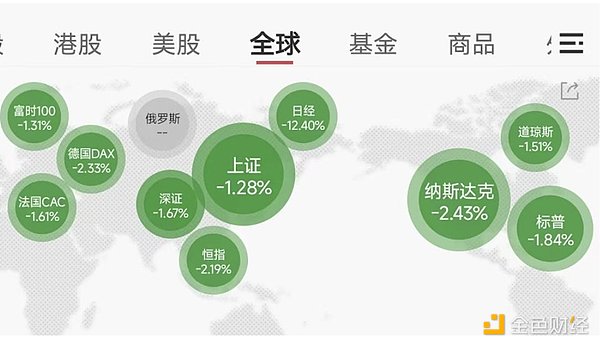
Recently, the monetary movements of the Bank of Japan have attracted much attention from global financial markets. The latest news shows that the Bank of Japan plans to further raise interest rates at the monetary meeting held from the 23rd to the 24th. It is expected to increase from the current around 0.25% to around 0.5%, the highest level since the 2008 financial crisis. At the end of July last year, the Japanese yen's interest rate hike caused the global financial market to plummet. Will it continue to replicate the last trend this time?
Previous market turmoil caused by the Japanese yen's interest rate hikeLast year, the Bank of Japan raised interest rates twice, completely bidding farewell to the era of negative interest rates.
On March 19, 2024, the Bank of Japan adjusted the interest rate from -0.1% to a range of 0% to 0.1%. After the announcement of the decision to raise interest rates, the Japanese stock market experienced some fluctuations, with the Nikkei 225 Index and Topix Index falling in the short term. Global capital markets, including crypto markets, have seen significant volatility.
On July 31, 2024, the Bank of Japan raised interest rates again, raising interest rates from 0% to 0.1% to 0.25%. The global financial market has experienced violent fluctuations. The exchange rate of the Japanese yen against the US dollar once surged 0.4%, reaching the highest level in seven months. Many markets in Asia and the Pacific fell tragically. Among them, the Nikkei 225 Index fell by more than 12%, the largest drop in history; the South Korean Composite Index fell by more than 10% during the session, triggering a circuit breaker, and European and American stock markets also fell. Bitcoin fell from US$60,000 to US$49,000, down about 15% during the day, and Ethereum fell by 23%, and the market was wailing.
Why does the Japanese yen have such great influence?As the world's largest carry currency, changes in the Japanese yen's interest rates have a profound impact on the global financial market. For a long time, because Japan has maintained ultra-low interest rates, the yen has become the currency of choice for international capital looking for high-yield financing. Investors borrow Japanese yen at low cost and invest in high-yielding assets such as U.S. bonds, U.S. stocks, cryptocurrencies or other high-yielding assets to earn interest differentials.
Raising interest rates will cause the yen to appreciate rapidly in a short period of time. Take the last "Black Monday" caused by Japan's last interest rate hike as an example. After the Bank of Japan suddenly raised interest rates, borrowing costs increased and market liquidity decreased, causing the stock market to fall. If investors previously used cheap Japanese yen to finance investments in the high-yield market, they now not only have to bear the decline in high-yield assets, but also face losses caused by the appreciation of the Japanese yen exchange rate. When investors dumped U.S. dollar assets to repay Japanese yen debt, it further exacerbated the situation in U.S. stocks and other financial markets.Product prices fell. At the same time, due to the liquidation of carry trades, a large amount of funds returned to Japan, further pushing up the yen exchange rate and bringing more pressure to liquidate the yen, forming a vicious circle.
Will this interest rate hike continue to replicate the last trend?In financial markets, expectations are the forerunner of behavior. The Bank of Japan's previous interest rate hike was not within market expectations. At that time, the market generally expected to maintain the current interest rate and not raise interest rates. Therefore, when interest rates were raised beyond expectations, it significantly increased market panic.
The impact of this interest rate hike on the market may be relatively limited. On the one hand, the Bank of Japan has fully communicated with the market to avoid unexpected currency modifications. With continued venting and high market expectations, market uncertainty has been reduced. On the other hand, compared with July 2024, the current market's net short position in the yen is not at an extreme state, so a reversal is unlikely. In addition, the relatively strong U.S. economy has also reduced market concerns about a global economic recession, which has helped stabilize market sentiment.
As the interest rate gap between the United States and Japan gradually narrows, carry trades may decrease and the pressure on the yen to depreciate may be alleviated. This will help enhance the competitiveness of the Japanese economy, attract more international capital to flow to the Japanese market, and boost the Japanese stock market.
Although the market has fully anticipated the interest rate hike, the interest rate hike itself may still bring certain fluctuations to the market. Therefore, investors should pay close attention to market reactions and use more flexible and efficient trading tools to respond to market changes.
4E, as a global partner of the Argentina team, integrates cryptocurrency, foreign exchange, bulk It integrates various financial products such as commodities, stocks and indices. It supports multiple index transactions such as the Nikkei Index, and also provides long and short leverage of 1,000 times for mainstream foreign exchange transactions such as Japanese yen, US dollars, euros, and British pounds, helping investors flexibly respond to market fluctuations and capture investment opportunities. In addition, there are financial products with annualized yields as high as 5.5%, providing investors with potential hedging options.











